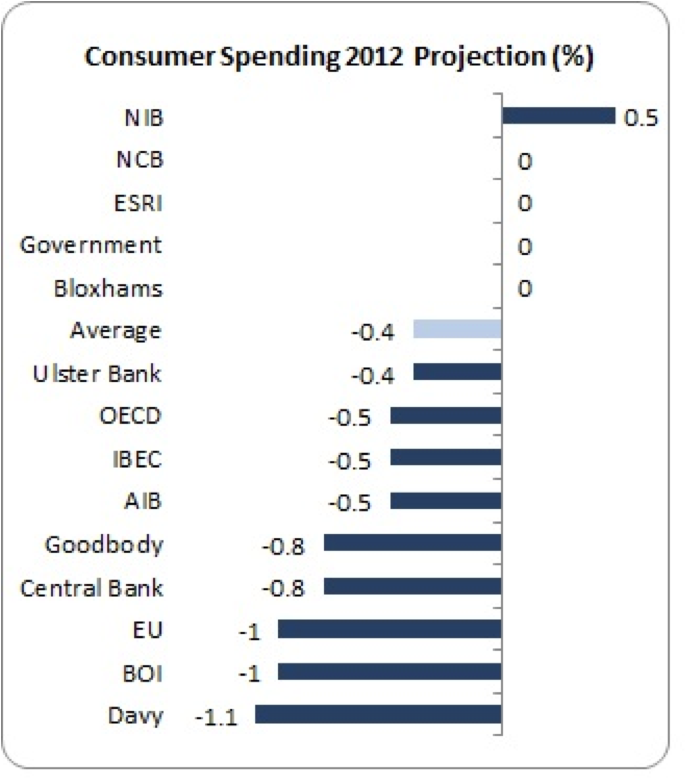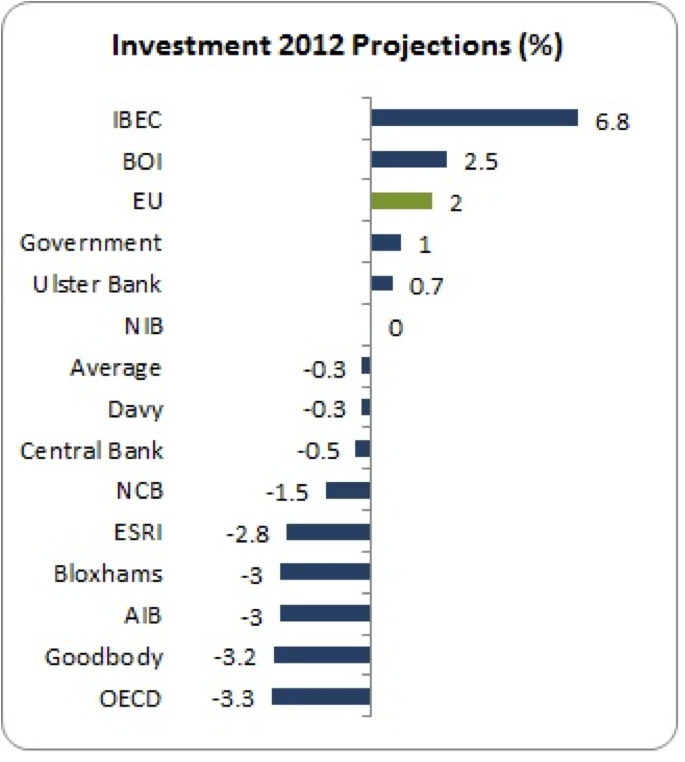The economy will recover - but not in 2012

Reports of a recovery in 2012 have been greatly exaggerated. By Michael Taft.
If I hear one more time that we have exited the recession I’m going to put my head through the computer screen. We’ve come to expect this line from cabinet ministers. But when commentators and media interviewers keep repeating this, per ministerial press statements, well...it’s getting a bit much. And when you add in the insult of paying of Anglo bondholders (€700 million on Tuesday, €1.25 billion in January), well...the economy sinks but bank creditors are 'recovering'.
Yes, this year GDP will be positive though the domestic economy as measured by the GNP will still be negative (probably). And next year, both metrics will be positive (probably). So does that mean the economy is out of a recession? No, only parts of it. All one has to do is take a quick peek below the headline rates to see an economy still in decline.
DKM’s Economy Watch brings together projections from official and private agencies, broken down by main economy indicators. The following includes forecasts from 14 analysts. All have been made in the last three months (except for the Government and the EU whose forecasts date back to May). Let’s see what they are projecting for next year.
Consumer Spending

Consumer spending makes up over half of the economy so it is crucial to growth, employment and business activity.
No one, apart from NIB, is projecting that consumer spending will recover. Four forecasters project that, at best, consumer spending will flatline. Nine forecasters believe it will continue falling next year. The average looks set to be -0.4%.
In short, over half of the economy – as measured by consumer spending – will still be in recession.
Government Spending on Public Services
Unsurprisingly, Government spending on public services is set to decline. That’s because its policy is to cut such expenditure. This is highly deflationary as it reduces direct employment and contracts to the private sector. The average forecast reduction is -2.7%. Overall, Government spending on public services, at both central and local level makes up nearly 17% of GDP (this doesn’t include social transfers such as social protections payments) and for every euro cut, the economy suffers a contraction of more than a euro. More recession there.
Investment

While investment makes up only 12% of total GDP, it is a vital component of economic growth because of its multiplier effects. It is a key driver in output and employment, which, in turn, drives up domestic demand and business activity.
There are wide variations in projections – from IBEC’s optimistic 6.8% growth to the OECD’s pessimistic -3.3% decline. The Government is hoping that investment will grow by 1% – but that estimate comes from May and may be revised downwards with the new four year plan.
On average, it is looking like investment will come in at a slight decline – driven by a continuing fall in residential investment.
* * *
So where does that leave us? Consumer spending, Government spending on public services and investment make up over 80% of the economy. Forecasters are predicting that all three components will be in decline next year (this is the domestic-demand element of the economy). How this can be called a recovery is beyond me.
The only reason the headline figures of GDP and GNP will be in positive (though GNP could still turn out negative) is because of the compensating growth of net exports – which make up less than 20% of the economy. The forecasters are predicting that exports will grow – on average by 5.2%. It is this category that will tip the headline into growth. But the rest of the economy will be in recession.
If we really want to depress ourselves we can go to the OECD's projections for 2013. They are projecting the domestic-demand recession will continue into 2013 - consumer spending and investment will rise minimally but cuts in Government spending on public services will keep domestic demand in negative figures. This is truly grim.
Just to round off, there are a couple of more projections to examine.
- First, the forecasters are projecting on average an unemployment rate of 14.2% this year, falling to an average forecast of 13.9%. It’s not that the dole queues are shortening because of any economic pick-up; we have to consider the role of emigration.
- Second, the level of employment Is expected to grow next year by a forecast average of 4,100. This won’t cover the number of new labour market entrants (e.g. graduating students). The Government is hoping there will be job growth of 9,000 but seven out of the 12 forecasters believe it will be less. The Central Bank is projecting employment growth to be less than 2,000.
So unemployment will fall back marginally while employment growth will be anaemic. This hardly points to a ‘recovery’.
So the next time you hear someone going on about a recovery in 2012, just keep in mind the image of a soufflé. When it is pulled out of the oven it’s puffed up and lovely. But when you prick it with the smallest of pins it collapses and you discover there is not much substance to it.
That’s what 2012 will be like – grim economic reality served up as a soufflé. {jathumbnailoff}
Image top: julejulesjules m.
